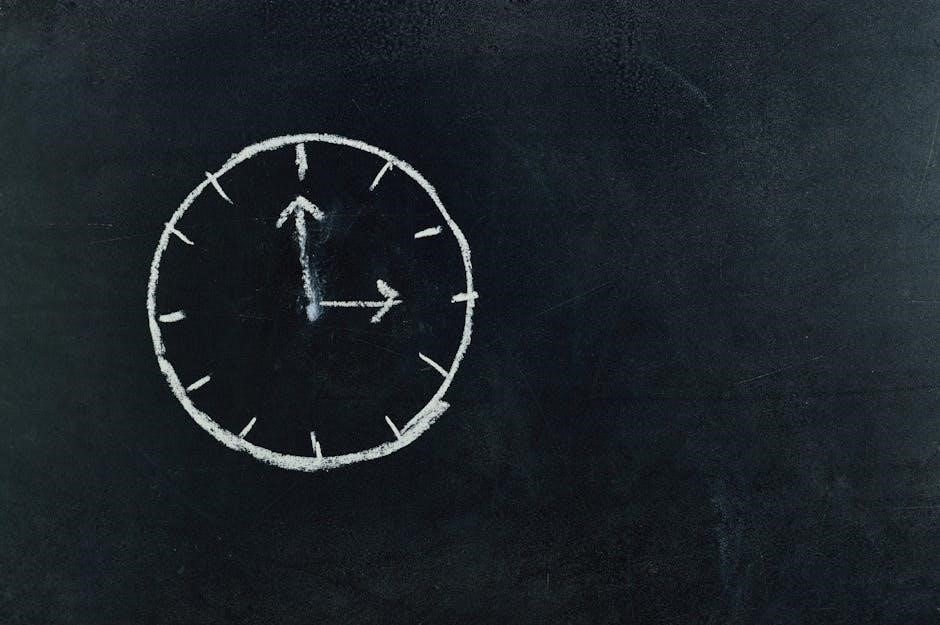Miami-Dade Recycling Schedule 2023 PDF: A Comprehensive Guide
Navigating waste management can be complex‚ especially concerning recycling schedules․ This comprehensive guide aims to simplify the Miami-Dade County 2023 recycling schedule‚ offering residents a clear understanding of waste collection services․ This ensures effective participation in recycling programs and contributes to environmental sustainability within the county․
Overview of Miami-Dade County’s Recycling Program
Miami-Dade County’s Department of Solid Waste Management (DSWM) provides comprehensive waste and recycling collection services to over 300‚000 residences․ The program aims to promote environmental sustainability through efficient waste reduction and recycling practices․ Curbside recycling services are available‚ with waste collected twice weekly and recycling every other week․ Several cities‚ including El Portal‚ Florida City‚ and Miami Beach‚ have inter-local agreements with Miami-Dade for recycling services․
The DSWM focuses on reducing recycling contamination‚ ensuring only accepted materials like paper‚ cardboard‚ glass‚ cans‚ and cartons are placed in recycling bins․ Residents can access a recycling calendar and Waste Service Guide for detailed information․ Collection schedules operate regularly on most holidays‚ except for Martin Luther King Jr․ Day and Christmas Day‚ which may affect the collection schedule․ The county also emphasizes proper solid waste management and beautification activities․
Environmentalists encourage increased composting and recycling efforts․ In 2023‚ Miami-Dade composted and recycled 38 percent of its waste․ The county provides resources like the Community Services website for residents to find information on garbage and recycling pickup days‚ aiming to make waste management accessible and effective․
Availability of the 2023 Recycling Schedule PDF
The Miami-Dade County Department of Solid Waste Management (DSWM) made the 2023 Recycling Schedule available in PDF format for easy access and convenience․ This digital format allowed residents to quickly determine their specific collection days and stay informed about any changes to the schedule․ The PDF version typically included a recycling calendar outlining the bi-weekly pickup dates for recyclable materials․
The Waste Service Guide‚ which includes the 2023 Recycling Calendar‚ was distributed to Miami-Dade Solid Waste Management customers; Residents could also access the Residential Dumpster Service Guide in digital format․ Having the recycling schedule in PDF format enabled residents to easily print or save the calendar to their devices for quick reference․ This ensured they never missed a recycling pickup day and could properly manage their waste disposal․
The availability of the 2023 Recycling Schedule PDF was part of the county’s effort to promote effective recycling practices and reduce contamination․ It provided residents with a user-friendly resource to stay organized and contribute to the county’s sustainability goals․ Miami-Dade County is not responsible for content provided on linked sites․
Accessing the Recycling Schedule Online
Miami-Dade County offers multiple avenues for residents to access their recycling schedule online‚ ensuring convenient and readily available information․ The official Miami-Dade County website serves as a primary hub‚ providing access to various solid waste management resources‚ including the recycling calendar․ Residents can typically find the schedule in PDF format for download and printing․

The Community Services website is another valuable resource‚ allowing users to locate government facilities and access information on services such as garbage and recycling pickup days; The City of Miami also provides an online tool where residents can enter their address to determine their specific garbage‚ recycling‚ and bulky trash pickup schedule․ Furthermore‚ the ReCollect system offers a convenient way to stay connected and receive reminders about waste and recycling collection days․
These online resources ensure that residents have multiple ways to stay informed about their recycling schedule‚ promoting effective waste management practices and reducing missed pickups․ Miami-Dade County is not responsible for content provided on linked sites․ These digital tools help residents stay organized and contribute to the county’s sustainability efforts․
Curbside Recycling Services in Miami-Dade
Miami-Dade County provides curbside recycling services to numerous residences‚ ensuring convenient and accessible recycling options for its residents․ The Department of Solid Waste Management (DSWM) oversees these services‚ offering regular collection schedules for recyclable materials․ Curbside recycling is also extended to several cities through inter-local agreements‚ including El Portal‚ Florida City‚ Medley‚ Miami Beach‚ Miami Springs‚ North Bay Village‚ South Miami‚ Virginia Gardens‚ and West Miami․
Waste collection is typically provided twice each week‚ while recycling occurs every other week․ Residents are encouraged to consult their Waste Service Guide or Recycling Calendar‚ which provides specific pickup dates and guidelines․ It’s crucial to place recycling bins out for collection 12-24 hours prior to the scheduled pickup time․ Miami-Dade County’s commitment to curbside recycling services helps to promote environmental stewardship and reduce landfill waste․
The county also focuses on reducing recycling contamination by ensuring that only accepted materials‚ such as paper‚ cardboard‚ glass‚ cans‚ and cartons‚ are placed in recycling bins․ Proper sorting and disposal practices are essential for maintaining the integrity of the recycling program and maximizing its effectiveness within Miami-Dade County․
Cities with Inter-local Agreements for Recycling
Miami-Dade County extends its recycling services beyond its direct jurisdiction through inter-local agreements with several cities․ These agreements ensure that residents in participating cities have access to the same recycling benefits as those within the county’s directly serviced areas․ The cities currently included in these agreements are El Portal‚ Florida City‚ Medley‚ Miami Beach‚ Miami Springs‚ North Bay Village‚ South Miami‚ Virginia Gardens‚ and West Miami․
Under these inter-local agreements‚ the Department of Solid Waste Management (DSWM) provides curbside recycling collection services to residents in these cities․ Waste collection is typically scheduled twice per week‚ while recycling pickup occurs every other week․ Residents are encouraged to consult the 2023 Recycling Calendar or Waste Service Guide to determine their specific collection days․
These partnerships demonstrate Miami-Dade County’s commitment to promoting recycling and environmental sustainability throughout the region․ By collaborating with neighboring cities‚ the county ensures a more consistent and effective approach to waste management․ Residents within these cities benefit from reliable recycling services‚ contributing to a cleaner and healthier environment for the entire community․ The inter-local agreements highlight the importance of regional cooperation in addressing waste management challenges․

Accepted Recyclable Materials
Miami-Dade County’s recycling program accepts a specific range of materials to ensure efficient processing and minimize contamination․ Residents are encouraged to familiarize themselves with the list of accepted items to maximize their recycling efforts and avoid placing non-recyclable materials in the blue recycling bins․ The primary categories of accepted recyclables include paper‚ cardboard‚ glass‚ cans‚ and cartons․
Paper products such as newspapers‚ magazines‚ and clean office paper are accepted․ Cardboard boxes should be flattened before being placed in the recycling bin to save space․ Glass bottles and jars of all colors are accepted‚ but lids should be removed․ Aluminum and steel cans‚ including food and beverage containers‚ are also recyclable․ Cartons‚ such as milk and juice cartons‚ are accepted as well․
It is crucial to avoid placing items that are not accepted in the recycling bin‚ as this can contaminate the entire batch and reduce its value․ Common contaminants include plastic bags‚ Styrofoam‚ food waste‚ and electronic devices․ The county emphasizes the importance of reducing recycling contamination to improve the effectiveness of the program and protect the environment․ By adhering to the guidelines and only recycling accepted materials‚ residents can contribute to a more sustainable future for Miami-Dade County․
Reducing Recycling Contamination
Recycling contamination poses a significant challenge to the effectiveness of waste management programs․ Miami-Dade County is actively working to reduce contamination in its recycling stream․ Contamination occurs when non-recyclable items are mixed with recyclable materials‚ compromising the quality and value of the recycled products․ Common contaminants include plastic bags‚ food waste‚ liquids‚ and certain types of plastics․
To combat this issue‚ the county has launched educational initiatives to inform residents about proper recycling practices․ Clear guidelines are provided on accepted and non-accepted materials․ Residents are encouraged to rinse food containers before placing them in the recycling bin to prevent food waste contamination․ Plastic bags should never be placed in the recycling bin‚ as they can entangle equipment at recycling facilities․
The Miami-Dade County Department of Solid Waste Management emphasizes the importance of sorting recyclables correctly․ By taking the time to understand what can and cannot be recycled‚ residents can significantly reduce contamination rates․ This leads to higher-quality recycled materials and a more sustainable waste management system․ The county is committed to providing resources and support to help residents recycle responsibly and reduce contamination․

Garbage and Recycling Collection Frequency
Understanding the collection frequency for garbage and recycling is essential for Miami-Dade County residents to manage their waste effectively․ Typically‚ garbage collection occurs twice a week for residential properties․ This ensures that household waste is removed promptly‚ maintaining cleanliness and hygiene within the community․ The specific days for garbage collection may vary depending on the location within the county․
Recycling collection‚ on the other hand‚ generally occurs once per week․ Residents are provided with designated recycling bins to separate recyclable materials from regular waste․ It’s crucial to consult the Miami-Dade recycling schedule for the specific collection day in your area․ The schedule outlines which materials are accepted for recycling‚ including paper‚ cardboard‚ glass‚ cans‚ and certain plastics․ Adhering to the schedule and guidelines ensures that recyclable materials are processed efficiently․
In some cities with inter-local agreements‚ waste collection might be twice a week‚ with recycling every other week․ To stay informed about your specific collection schedule‚ refer to your Waste Service Guide or Recycling Calendar․ Staying informed helps you to manage waste and recycling․
Holiday Collection Schedule

Miami-Dade County’s holiday collection schedule for garbage and recycling can vary‚ especially on or around major holidays․ To avoid any disruptions in service‚ it’s important to be aware of these changes․ Generally‚ the Department of Solid Waste Management (DSWM) maintains a regular weekday schedule on most holidays‚ ensuring consistent waste collection for residents․ However‚ there are exceptions‚ such as Martin Luther King Jr․ Day and Christmas Day‚ when services may be affected․
On holidays like Martin Luther King Jr․ Day‚ the DSWM might be closed‚ leading to a change in the collection schedule․ In such cases‚ the recycling calendar usually indicates make-up dates for collections that would normally fall on the holiday․ It’s essential to refer to your specific recycling calendar or the DSWM website for accurate information regarding holiday collection schedules․ For example‚ in 2023‚ all DSWM waste and recycling collection services maintained a regular weekday schedule on New Year’s Day․
Staying informed about the holiday collection schedule ensures that waste and recycling are managed efficiently‚ even during holiday periods․ Always check official sources for the most up-to-date information․
Bulky Waste Pickup Information
Miami-Dade County provides bulky waste pickup services to its residents‚ allowing for the proper disposal of large items that cannot be accommodated by regular garbage collection․ This service is designed to handle items such as furniture‚ appliances‚ and other oversized materials that are difficult to manage through standard waste disposal methods․ Residents can typically schedule two bulky waste pickups each calendar year‚ providing a convenient way to get rid of unwanted large items․
To schedule a bulky waste pickup‚ residents may need to contact the Department of Solid Waste Management (DSWM) or use the online services provided by the county․ When scheduling‚ it’s important to provide accurate information about the type and quantity of items to be collected․ This helps the DSWM plan accordingly and ensure efficient pickup․ Additionally‚ there may be specific guidelines regarding how to prepare the items for collection‚ such as placing them at the curb in a safe and accessible manner․
Staying informed about the bulky waste pickup guidelines and scheduling procedures ensures that residents can effectively utilize this service․ This helps maintain a clean and organized community while promoting responsible waste management practices throughout Miami-Dade County․
Changes to Bulky Waste Pickup (2022-2023)
Miami-Dade County implemented changes to its bulky waste pickup program between 2022 and 2023‚ impacting residents’ disposal options for large items․ These changes aimed to improve efficiency‚ reduce illegal dumping‚ and better manage waste collection services throughout the county․ During the initial 15 months of the program‚ from January 2022 to March 2023‚ various adjustments were made to streamline the process and address challenges encountered․
Some of the key changes included modifications to scheduling procedures‚ collection routes‚ and acceptable item lists․ Residents may have experienced alterations in the frequency of pickups or specific requirements for preparing bulky waste for collection․ These adjustments were part of an effort to optimize resource allocation and ensure that the bulky waste pickup program effectively serves the needs of the community while minimizing environmental impact․
Staying informed about these changes is crucial for residents to properly utilize the bulky waste pickup service and comply with the updated guidelines․ By understanding the modifications made during this period‚ residents can contribute to a more efficient and sustainable waste management system in Miami-Dade County․
Contact Information for Waste and Recycling Queries
For any questions or concerns regarding waste and recycling services in Miami-Dade County‚ several contact options are available to residents․ The Miami-Dade County Department of Solid Waste Management (DSWM) is the primary point of contact for inquiries related to garbage collection‚ recycling schedules‚ bulky waste pickup‚ and other waste-related matters․ Residents can reach the DSWM through multiple channels‚ ensuring convenient access to information and assistance․
One of the easiest ways to get in touch is by calling 311‚ the county’s information hotline․ This service provides a centralized hub for all county-related inquiries‚ including waste and recycling․ Alternatively‚ residents can contact the DSWM directly at a dedicated phone number for waste and recycling inquiries․ The DSWM website is another valuable resource‚ offering detailed information on services‚ schedules‚ and accepted materials‚ as well as online contact forms for submitting questions or requests․
By utilizing these contact options‚ residents can promptly address any concerns and receive clarification on waste and recycling matters‚ contributing to a more informed and engaged community․
